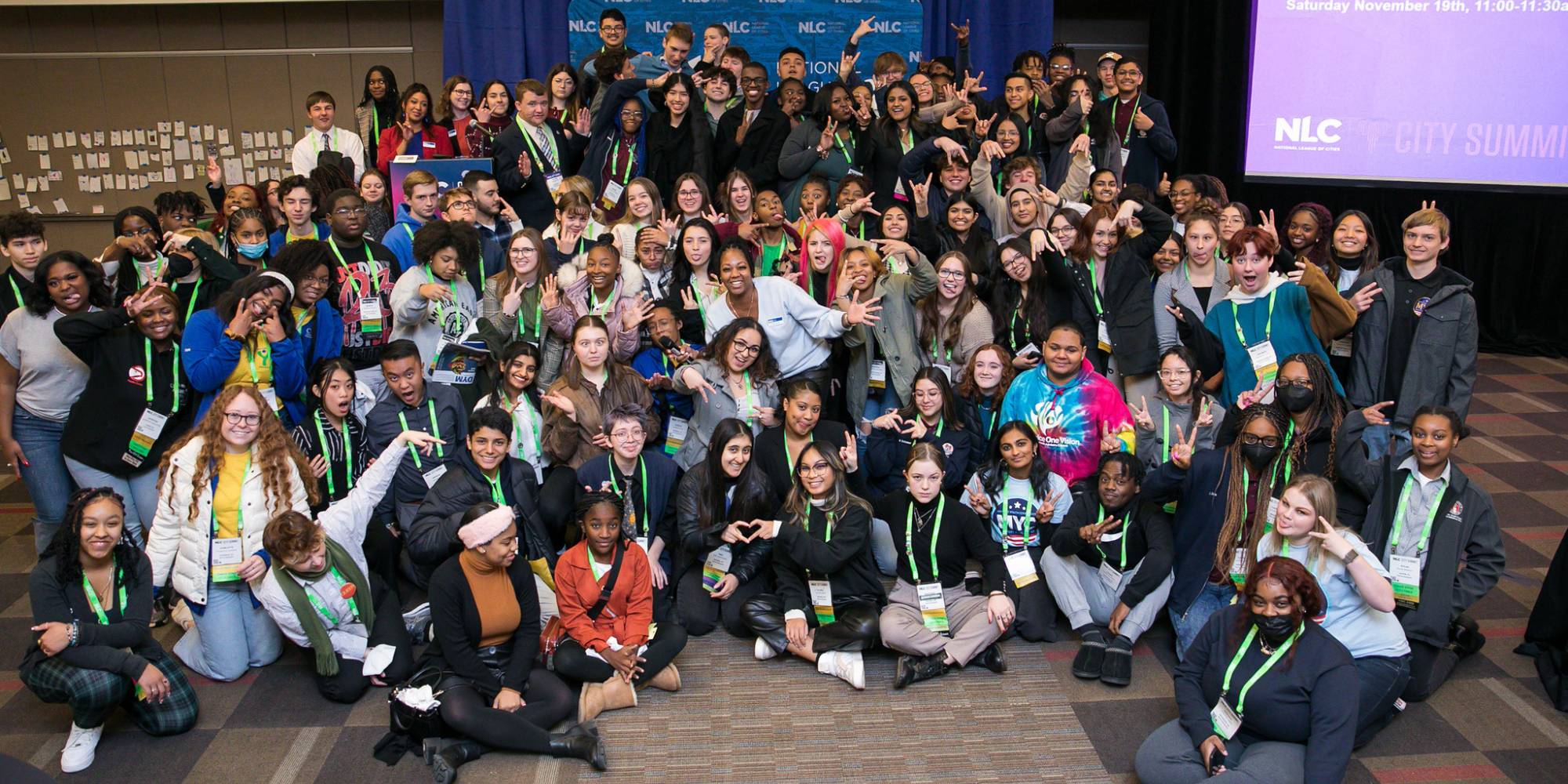Written in collaboration with Sue Cardenas-Soto, a copywriter with The Trevor Project.
The World Health Organization defines health as the presence of ‘complete physical, mental and social well-being’ and not just the absence of disease. At the National League of Cities, we work with cities and communities to address the full spectrum of good health through housing, transportation, safety and environmental interventions. Many, if not most of us in the United States, have felt our complete health has been challenged, in part by the pandemic and its subsequent economic and social consequences. In fact, the WHO reports that the prevalence of anxiety and depression increased by twenty-five percent globally. In the US, the number of adults reporting anxiety or depression during the pandemic quadrupled in 2019 (www.kff.org). The pandemic also negatively impacted young adults (ages 18 -24) mental health, with fifty-five percent reporting anxiety or depressive disorder.
The Trevor Project’s mission is to end suicide among LGBTQ young people, and it provides crisis services to LGBTQ young people day and night. Their annual National Survey on LGBTQ Youth Mental Health is one of the most diverse surveys of LGBTQ young people ever conducted. It explores the mental health among LGBTQ youth from 13 to 24 years old across the US, showing the severity of mental health issues among this diverse and vibrant demographic.
The topline numbers are stark: forty-five percent of LGBTQ youth seriously considered suicide in the past year, while seventy-three percent reported experiencing symptoms of anxiety and fifty-eight percent reported experiencing symptoms of depression.
LGBTQ young people face unique challenges that negatively contribute to their mental health, including discrimination. Seventy-three percent reported that they have experienced discrimination based on their sexual orientation or gender identity at least once in their lifetime, while thirty-six percent reported that they have been physically threatened or harmed due to either their sexual orientation or gender identity. Furthermore, LGBTQ youth who have experienced discrimination based on gender identity and or sexual orientation are more than twice as likely to attempt suicide as those who did not.
Unfortunately, access to mental health care and resources remains a significant issue for LGBTQ youth. Eighty-two percent reported wanting mental health care in the past year. Less than half of that group was able to receive the help they needed, while sixty percent of LGBTQ youth who wanted mental health care were not able to access it. While the barriers to care are especially high among LGBTQ youth, this issue is also being felt by young people of all sexual orientations in cities across the country.
During its national conferences, NLC convenes youth delegates who serve on their city’s mayoral youth councils to discuss ways they can address their cities’ largest challenges. Mental health was the number one topic youth wanted to discuss during this year’s City Summit conference, with many youths noting the lack of access to resources and adequate mental health care available in their communities.
The reasons for the lack of access to care more broadly align with many of the contributing factors to poor mental health among LGBTQ youth. Acceptance and understanding are key, as fear of discussing mental health concerns and of not being taken seriously were among the top barriers for LGBTQ youth accessing mental health care, as well as concerns about obtaining consent from parents. Youth delegates at City Summit similarly noted the importance of having supportive families and communities in helping them access mental health care and resources. Many stated that their family’s lack of acceptance of their mental health concerns, or lack of awareness of these issues themselves, further exacerbated some of the challenges the youth were facing and hurt their ability to access adequate care. This underscores the importance of supportive families and communities in promoting the mental health of all youth, especially LGBTQ youth, as it can help mitigate mental health issues while encouraging youth to seek the help they need.
In fact, LGBTQ youth who lived in an accepting community and had access to LGBTQ-affirming spaces, and/or felt high social support from family and friends, reported significantly lower rates of attempting suicide in the past year. For fifty-five percent of LGBTQ youth, that accepting space is found at school, while just thirty-seven percent identified home as such a space.
This highlights the importance of mental health education, so that young people have the knowledge they need to recognize their own mental health struggles and identify what care is available to support them. While many mental health concerns require professional medical treatment, many of NLC’s youth delegates believe that individuals can begin addressing some issues on their own if they are given the tools and education to do so.
It’s important to note that the intersectionality of identities can also play a role in youth mental health, and in LBGTQ youth mental health in particular. LGBTQ youth of color may face additional discrimination, which can compound the mental health challenges they already face. That even shows up among the reasons youth did not seek mental health care, as BIPOC youth felt providers would not understand their culture/race.
While informal support through accepting families and communities is important to young people, formal support from the government and other institutions is also vital to creating an inclusive, affirming society. In The Trevor Project’s survey, ninety-three percent of transgender and nonbinary youth said that they have worried about transgender people being denied access to gender-affirming medical care due to state or local laws.
This is where cities can provide support to LGBTQ young people in particular during a nationwide mental health crisis. In addition to encouraging safe, accepting spaces and communities for all youth, cities can formally codify protections for LGBTQ young people specifically and institute policies that better serve their needs, especially related to mental health.
The Trevor Project’s mission is to end suicide among young LGBTQ people. The Trevor Project offers a suite of 24/7 crisis intervention and suicide prevention programs, including TrevorLifeline, TrevorText, and TrevorChat as well as the world’s largest safe space social networking site for LGBTQ youth, TrevorSpace. Trevor also operates an education program with resources for youth-serving adults and organizations, an advocacy department fighting for pro-LGBTQ legislation and against anti-LGBTQ rhetoric/policy positions, and a research team to discover the most effective means to help young LGBTQ people in crisis. If you or someone you know is feeling hopeless or suicidal, our trained crisis counselors are available 24/7 at 1-866-488-7386 via chat www.TheTrevorProject.org/Help, or by texting START to 678-678.












